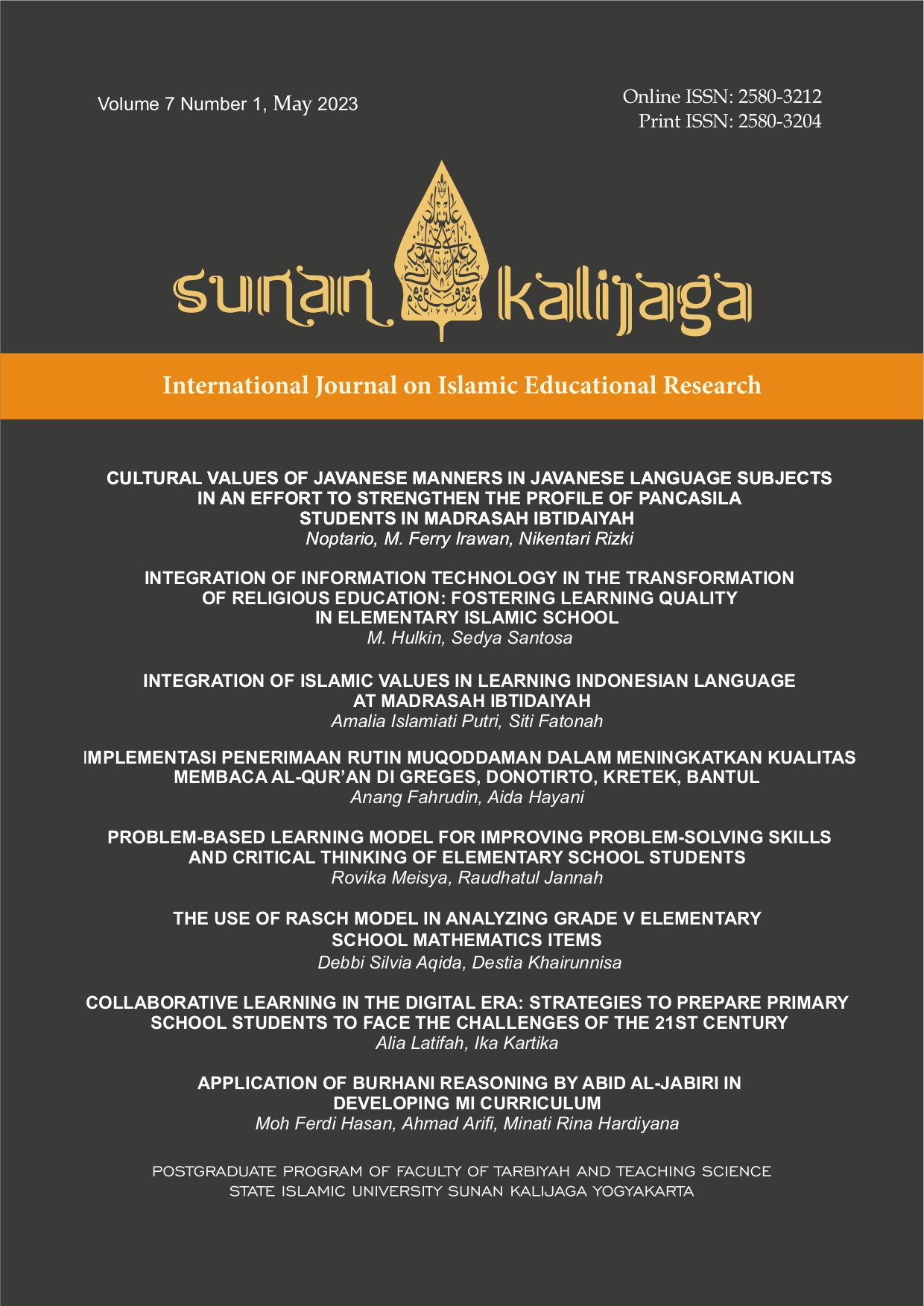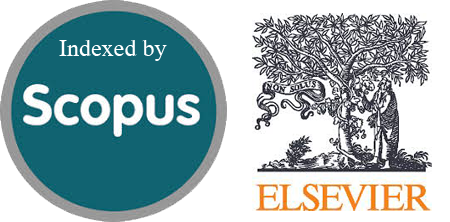Cultural Values of Javanese Manners in Javanese Language Subjects in an Effort to Strengthen the Profile of Pancasila Students in Madrasah Ibtidaiyah
DOI:
https://doi.org/10.14421/skijier.2023.71.01Keywords:
Values, Javanese manners culture, Pancasila student profile, Madrasah IbtidaiyahAbstract
The rapid influx of globalisation that reaches millennials and gen z, the next generation of Indonesia, certainly has a negative impact that must be dealt with. One of the negative impacts is that local cultures are increasingly abandoned and forgotten, to answer these problems, of course, must use a special strategy so that students in schools understand and can apply local cultures. The Pancasila student profile is one of the flagship programmes in the Merdeka curriculum which aims to shape student character, one of the themes contained in the Merdeka curriculum is the theme of local wisdom which discusses local cultures, so it is hoped that it can help students understand the values in local culture in their area. This research uses a qualitative research approach with a field research method. Data collection techniques in this study used interviews and previous research as references and reinforcements. While the data analysis technique uses miles and hubermans theory with data condensation, data presentation, conclusion drawing and verification. The values in Javanese manners culture consist of the value of respect and courtesy, the value of Silih asih, silih asah and silih asuh, the value of speaking ethics and the value of simplicity. The four values can be obtained by students through the project of strengthening the profile of Pancasila students on the theme of local wisdom, so it is hoped that the Javanese manners culture taught in Javanese language subjects is expected to help strengthen the profile of Pancasila students.
References
Agustin, D. S. Y. (2011). PENURUNAN RASA CINTA BUDAYA DAN NASIONALISME GENERASI MUDA AKIBAT GLOBALISASI. JURNAL SOSIAL HUMANIORA (JSH), 4(2), Article 2.
Handayan, R. (2021, July 12). 8 Klaster Ayat Alquran yang Abadikan Adab Bermasyarakat. Republika Online. https://republika.co.id/share/qw4ro2320
Irawan, M. F., & Latifah, A. (2023). The Implementation of Kahoot! Application as a Hots-Based Evaluation Media for Elementary School Students. Al-Aulad: Journal of Islamic Primary Education, 6(2), Article 2. https://doi.org/10.15575/al-aulad.v6i2.26389
Irmania, E. (2021). Upaya mengatasi pengaruh negatif budaya asing terhadap generasi muda di Indonesia. Jurnal Dinamika Sosial Budaya, 23(1), Article 1. https://doi.org/10.26623/jdsb.v23i1.2970
Karmadi, A. D. (2017, March 27). Budaya lokal sebagai warisan budaya dan upaya pelestariannya [Monograph]. Direktorak Jenderal Kebudayaan: BPNB D.I. Yogyakarta. https://repositori.kemdikbud.go.id/1063/
Kasmawati, Y. (2019). Pentingnya budaya kolaboratif: Suatu tinjauan literatur. Jurnal Manajemen Strategi Dan Aplikasi Bisnis, 2(2), Article 2. https://doi.org/10.36407/jmsab.v2i2.97
Noer, M. A., & Sarumpaet, A. (2017). Konsep Adab Peserta Didik dalam Pembelajaran menurut Az-Zarnuji dan Implikasinya terhadap Pendidikan karakter di Indonesia. Al-Hikmah: Jurnal Agama Dan Ilmu Pengetahuan, 14(2), Article 2. https://doi.org/10.25299/al-hikmah:jaip.2017.vol14(2).1028
Noptario, Hulkin, M., & Nordin, T. S. N. bin. (2023). Transitioning from National Examinations to Computer-Based National Assessments: Teachers’-Students’ Perceptions and the Impact on Islamic Education. HEUTAGOGIA: Journal of Islamic Education, 3(1), Article 1. https://doi.org/10.14421/hjie.2023.31-10
Noptario, N., Faisal, F., & Tastin, T. (2022). Strategi Guru Kelas dalam Membimbing Karakter Jujur Siswa di Madrasah Ibtidaiyah Palembang. Limas Pendidikan Guru Madrasah Ibtidaiyah, 3(1), 1–9.
Noptario, N., Latifah, A., Fitria, H., & Zulfa, F. N. (2023). Application of the Skilbeck Model Curriculum Development in Elementary Schools in School Quality Assurance Efforts. JIP (Jurnal Ilmiah PGMI), 9(1), 82–92. https://doi.org/10.19109/jip.v9i1.17101
Noptario, N., Zulfa, F. N., & Arif, M. (2023). Formulasi Konsep Pendidikan Akhlak Pada Mata Pelajaran Akidah Akhlak di Madrasah Ibtidaiyah Palembang Dalam Mewujudkan Siswa yang Berakhlakul Karimah. Jurnal Ilmiah Wahana Pendidikan, 9(3), 342–349.
Nurainun, N. (2022). Peran Guru Pendidikan Agama Islam (PAI) Membina Adab Berkomunikasi Dalam Pembelajaran Daring di SMK Swasta Anak Bangsa Desa Bandar Siantar Pematang Siantar [Skripsi, Universitas Islam Negeri Sumatera Utara]. http://repository.uinsu.ac.id/15663/
Nurhayati, E. (2013). Strategi Pemertahanan Bahasa Jawa Di Provinsi Daerah Istimewa Yogyakarta. LITERA, 12(1), Article 1. https://doi.org/10.21831/ltr.v12i01.1338
Purnani, S. T. (2017). Bahasa Jawa: Perspektif Tolok Ukur Budaya Santun Tata Krama. 637–641. http://lamas.undip.ac.id
Purwadi. (2011). Etika Komunikasi dalam Budaya Jawa. Volume 9, Nomor 3, halaman 239-249.
Rahman, A. (2016). Pengaruh Negatif Era Teknologi Informasi dan Komunikasi pada Remaja (Perspektif Pendidikan Islam). Al-Ishlah: Jurnal Pendidikan Islam, 14(1). https://doi.org/10.35905/alishlah.v14i1.384
Saodah, S., Amini, Q., Rizkyah, K., Nuralviah, S., & Urfany, N. (2020). Pengaruh Globalisasi terhadap Siswa Sekolah Dasar. PANDAWA, 2(3), Article 3. https://doi.org/10.36088/pandawa.v2i3.907
Sari, L. E., Rahman, A., & Baryanto, B. (2020). Adab kepada Guru dan Orang Tua: Studi Pemahaman Siswa pada Materi Akhlak. Edugama: Jurnal Kependidikan Dan Sosial Keagamaan, 6(1), Article 1. https://doi.org/10.32923/edugama.v6i1.1251
Sary, O. I. P. (2022). Keterlibatan Orang Tua Dalam Penanaman Nilai Tata Krama Budaya Jawa Di Lingkungan Karaton Surakarta Pada Anak Usia 5-6 Tahun. Jurnal Anak Usia Dini Holistik Integratif (AUDHI), 5(1), Article 1. https://doi.org/10.36722/jaudhi.v5i1.923
Yunus, Y., & Mukhlisin. (2020). Sosial-Budaya: Harmonisasi Agama Dan Budaya Dalam Pendidikan Toleransi. Kalam: Jurnal Agama Dan Sosial Humaniora, 8(2), Article 2. https://doi.org/10.47574/kalam.v8i2.78
Zis, S. F., Effendi, N., & Roem, E. R. (2021). Perubahan Perilaku Komunikasi Generasi Milenial dan Generasi Z di Era Digital. Satwika : Kajian Ilmu Budaya Dan Perubahan Sosial, 5(1), Article 1. https://doi.org/10.22219/satwika.v5i1.15550










